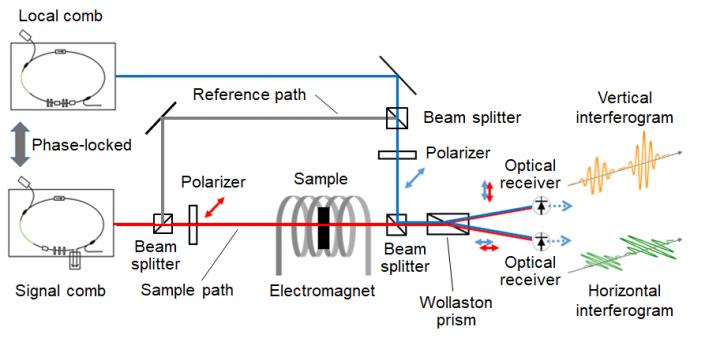New tools for polarization and spectroscopic measurement and material development

Block diagram of Faraday effect measurement system using dual-comb spectroscopy.
Professor Kaoru Minoshima from the University of Electro-Communications and NEOARK Corporation have succeeded in prototyping a greatly improved magneto-optic effect (*1) measurement device as part of the ERATO MINOSHIMIA Intelligent Optical Synthesizer Project, under the JST Strategic Basic Research Programs. An exhibition of the prototype device is planned for the Science Photonics Fair 2019 being held at the Science Museum from November 12 to 14, 2019.
Dual-comb spectroscopy is a new spectroscopy that uses two precisely controlled ultrashort pulse lasers, known as optical frequency combs (optical combs). Dual-comb spectroscopy offers major improvements over conventional Fourier spectroscopy (*2) in areas including resolution, sensitivity and measuring time. Thus far, dual-comb spectroscopy has primarily been used for gas spectroscopy. The project that is the first in the world to develop a solid physical property evaluation technology using dual-comb spectroscopy(*3), has demonstrated the principles in various physical property measurements.
As a first step in developing practical applications of the technique, Professor Minoshima and her colleagues developed a magneto-optic effect measurement device capable of evaluating the characteristics of magnetic materials. The optical system and signal detection system of the prototype were improved to achieve measurement performance that greatly exceeds conventional measurement methods.
The prototype achieved major progress towards practical application, featuring a magneto-optic effect measurement resolution of 0.01 degree, a wavelength resolution of 0.01 nanometer, capable of high-speed measurement through batch measurements of all wavelength components. The prototype is a desktop system, consisting of a measurement unit, a dual-comb light source, and a controller. The generated magnetic field is a maximum of ± 10 kilo-Oersted.
Furthermore, based on the above-mentioned solid physical property evaluation technology, the research team also developed a prototype device for measuring the complex refractive index (*4) of solids. A major feature of the prototype is its capability to measure the phase difference of light in addition to its intensity ratio.
Measurement devices leveraging dual-comb spectroscopy for magneto-optic effect measurement and complex refractive index measurement are expected to become important new tools for the precise measurement of polarization and spectroscopy, and for the material development. They will proceed with development targeting commercialization in the near future.
###
(*1) Magneto-optic effect
A phenomenon in which the polarization state of light changes when a substance is irradiated with light. The change in polarization state of transmitted light is called the Faraday effect, and the change in the polarization state of reflected light is called the magnetic Kerr effect. Also, the rotation angle of the polarization plane is referred to as the Faraday rotation angle and the Kerr rotation angle, respectively.
(*2) Fourier spectroscopy
A method of performing spectral analysis by Fourier-transforming an interference signal of light obtained using a two-beam interferometer.
(*3) Solid physical property evaluation technology using dual-comb spectroscopy
Prof. Minoshima et al. demonstrated for the first time in the world that dual-comb spectroscopy, which was previously used mainly for gas composition analysis, can also be used for the evaluation of physical properties, such as the analysis of complex refractive index spectra of solid materials.
Ref.
A. Asahara, A. Nishiyama, S. Yoshida, K. Kondo, Y. Nakajima, and K. Minoshima, “Dual-comb spectroscopy for rapid characterization of complex optical properties of solids,” Optics Letters 41, 4971-4974 (2016).
(*4) Complex refractive index
When the refractive index of a substance is n and the extinction coefficient representing absorption is k, n-ik is referred to as the complex refractive index. It is very convenient to use the complex refractive index when expressing a wave by an exponential function.
Media Contact
Kaoru Minoshima
[email protected]
81-424-435-758
Original Source
https:/




